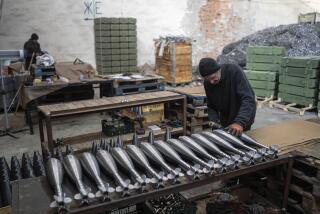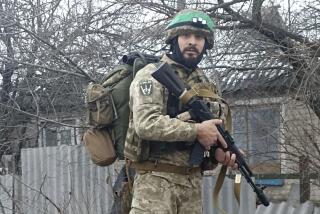Colombia learns from strife
BOGOTA, COLOMBIA — Security is big business in Colombia, where a four-decade civil war has spawned a cottage industry of manufacturers and service firms whose mission is to keep their clients alive.
Firms such as armored car manufacturer Blindex and armored clothing maker Miguel Caballero, both based in Bogota, have even earned international renown. With security improving since President Alvaro Uribe took office in 2002 -- murders and kidnappings are down -- demand has been declining at home. But export sales are making up the difference. And the U.S. government is a big client.
Security in Colombia has become a $100-million industry, with exports accounting for about half of all revenue, according to the superintendent for Vigilance and Private Security, which regulates the industry.
The industry’s growth rate is about 10% annually, according to government statistics, with armored cars and clothing among the fastest-growing segments, said Superintendent Felipe Munoz. Security consulting by Colombians is also on the rise.
Blindex “up-armors” 350 Toyotas and other sport utility vehicles each year, selling the majority of them to the U.S. for use by soldiers and government employees in Iraq and Afghanistan. Although most of its sales five years ago were to Colombian clients worried about kidnapping, robberies or murder, the company now ships 70% of its cars -- which cost as much as $140,000 each -- overseas.
“Luck always plays a role, and once the Iraq war began, the U.S. government was quickly overwhelmed by the demand for products like ours,” Blindex Vice President Laurent Fossaert said. “The Americans found us, we weren’t looking for them.”
Fossaert’s company is one of only four firms worldwide whose up-armoring work is accepted by the U.S. departments of State and Defense. U.S. government security experts pay regular visits to Blindex factories in Bogota and Barranquilla to review requirements in the face of ever-changing security threats.
Blindex says the key to the durability of its automobiles is not the materials, which include high-quality steel, but the design, perfected over nearly three decades of trial and error in Colombia’s high-risk environment.
“Colombia is our laboratory,” Fossaert said. “The trick is to build a car that is totally secure but not so heavy that it won’t still move fast if necessary. You can build a car impervious to blasts but so ponderous that it won’t brake.”
Iraq and Afghanistan, however, are posing enormous challenges as insurgents’ weapons become increasingly lethal, he said.
Blindex cars have proved capable of withstanding blasts from improvised explosive devices, the leading cause of death of soldiers and government workers in Iraq. Passengers have survived bombs made with as many as four pounds of plastic explosives and with 105mm and 155mm mortar shells.
But Fossaert acknowledges that the company is at a loss to up-armor against the newest IEDs, which incorporate so-called explosively formed devices. These are made with a copper shell that, upon explosion, becomes a high-speed, molten copper projectile that can penetrate even tanks.
Fossaert said that “armies from various countries” have asked his firm to make military vehicles, a request that Blindex has so far refused on philosophical grounds.
“It’s nice to know our vehicles save lives. It would not be so agreeable to know that, as offensive weapons, they helped kill people,” Fossaert said.
Mayhem also has been good for armor maker Caballero, which manufactures a broad line of military, police and civilian clothing that can withstand shrapnel and large-caliber bullets. The company’s clients include Prince Felipe of Spain, Venezuelan President Hugo Chavez, King Abdullah II of Jordan and Hollywood star Steven Seagal.
Caballero uses a patented weave of nylon and polyester to make fabrics that can stop a .38 caliber bullet, said Miguel Caballero, 39, founder and president of the 300-employee firm. His showroom features products including bulletproof vests, minesweepers’ gear and armored ties and shirts that look perfectly normal. A big seller is an armored version of the tropical shirt called the guayabera that Mexican President Felipe Calderon recently ordered.
“Products such as these,” said Caballero, “could only develop here because of what we have been through in this country for 40 years.”
More to Read
Sign up for Essential California
The most important California stories and recommendations in your inbox every morning.
You may occasionally receive promotional content from the Los Angeles Times.










